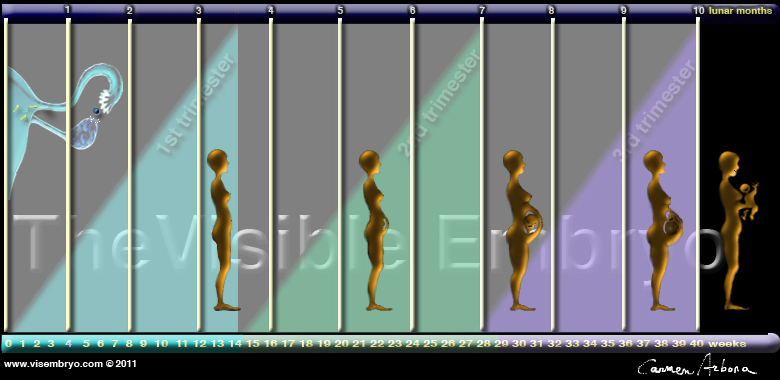|
|
Developmental Biology - Newborn Immune System
Immune System Develops in First Days of Life
Newborn innate immune pathways rapidly develop in the first days of life...
In the womb, a human fetus benefits from the protection of the placenta which limits fetal contact with pathogens. Once born, babies face a myriad of environmental germs completely new to them and their own immune system must rapidly develop in response to protect them. But how does this happen in the first days of life?
Researchers from Boston Hospital fosters international collaboration among academia, government and industry to develop vaccines tailored to protect vulnerable populations — such as the very young and the elderly. The Precision Vaccines Program at Boston Children's Hospital received funding from the Human Immunology Project Consortium (HIPC) of the National Institute of Allergy and Infectious Diseases (NIAID) to study the timing of different components of the immune system during the first week of life.
For the first time, an acute immune response starting right after birth was followed by a progressive increase in the newborn infant's own immunity, was observed. The work is published in the journal Frontiers in Immunology.
"Our study revealed developmental changes in the infant immune system defined by the first 7 days of life, in two independent sample groups. Furthermore, we provided insights into development of the immune system which appear to be initiated by infant immune triggers associated with birth."
Hanno Steen PhD, Department of Pathology, Boston Children’s Hospital, Boston, Massachusetts (MA); Precision Vaccines Program, Boston Children’s Hospital, Boston, MA; Harvard Medical School, Boston, MA, United States; and lead author.
Scientists sampled proteins from newborn blood plasma, in two independent populations - The Gambia (West Africa) and Papua New Guinea (PNG) - at birth and the first, third, and seventh days of life. Using this approach, scientists were able to follow blood components of newborn immunity developing in the first week of human life.
Right after birth, the team saw an increase of plasma proteins involved in an acute inflammatory response, suggesting the immune system has been activated and was responding — a brand new immune system observation. This immune response was followed by an increase related to an innate immune pathway called the complement system, as early as 24 hours after birth.
The complement pathway recruits several protein complexes (C1 to C9) which destroy targeted pathogens. Complement proteins increased as complement inhibitors decreased — until day seven.
This analysis reveales antibodies transmitted by the mother decline rapidly during the first week of life, while antibodies related to the "innate immune" neonatal complement pathway increase activation (IgM and IgG1). Altogether, these results suggest the complement pathway may have a central role in neonatal immunity as an important defense mechanism against pathogens in infancy.
Better understanding the immune system and its development in the first week of life is important given the frequency of infections in early life.
Neonatal infections cause 700,000 annual deaths, or 40% of mortality in children under five years of age.
"Having a better understanding of the immune system at the beginning of life will be pivotal for the development of precision vaccines for newborns, one of the major goals of the Precision Vaccines Program at Boston Children's Hospital," explains Hanno Steen PhD, Harvard Medical School, Boston, Massachusetts, USA.
Abstract
Neonates have heightened susceptibility to infections. The biological mechanisms are incompletely understood but thought to be related to age-specific adaptations in immunity due to resource constraints during immune system development and growth. We present here an extended analysis of our proteomics study of peripheral blood-plasma from a study of healthy full-term newborns delivered vaginally, collected at the day of birth and on day of life (DOL) 1, 3, or 7, to cover the first week of life. The plasma proteome was characterized by LC-MS using our established 96-well plate format plasma proteomics platform. We found increasing acute phase proteins and a reduction of respective inhibitors on DOL1. Focusing on the complement system, we found increased plasma concentrations of all major components of the classical complement pathway and the membrane attack complex (MAC) from birth onward, except C7 which seems to have near adult levels at birth. In contrast, components of the lectin and alternative complement pathways mainly decreased. A comparison to whole blood messenger RNA (mRNA) levels enabled characterization of mRNA and protein levels in parallel, and for 23 of the 30 monitored complement proteins, the whole blood transcript information by itself was not reflective of the plasma protein levels or dynamics during the first week of life. Analysis of immunoglobulin (Ig) mRNA and protein levels revealed that IgM levels and synthesis increased, while the plasma concentrations of maternally transferred IgG1-4 decreased in accordance with their in vivo half-lives. The neonatal plasma ratio of IgG1 to IgG2-4 was increased compared to adult values, demonstrating a highly efficient IgG1 transplacental transfer process. Partial compensation for maternal IgG degradation was achieved by endogenous synthesis of the IgG1 subtype which increased with DOL. The findings were validated in a geographically distinct cohort, demonstrating a consistent developmental trajectory of the newborn’s immune system over the first week of human life across continents. Our findings indicate that the classical complement pathway is central for newborn immunity and our approach to characterize the plasma proteome in parallel with the transcriptome will provide crucial insight in immune ontogeny and inform new approaches to prevent and treat diseases.
Authors
Tue Bjerg Bennike, Benoit Fatou, Asimenia Angelidou, Joann Diray-Arce, Reza Falsaf, Rebecca Ford, Erin E. Gill, Simon D. van Haren, Olubukola T. Idoko, Amy H. Lee, Rym Ben-Othman, William S. Pomat, Casey P. Shannon, Kinga K. Smolen, on behalf of The EPIC Consortium, Scott J. Tebbutt, Al Ozonoff, Peter C. Richmond, Anita H. J. van den Biggelaar, Robert E. W. Hancock, Beate Kampmann, Tobias R. Kollmann, Ofer Levy and Hanno Steen.
Acknowledgements
The authors would like to thank all the participants and their parents for their time and willingness to support this study. Research reported in this publication was supported by the National Institute of Allergy and Infectious Diseases (NIAID) of the National Institutes of Health (NIH) as part of the Human Immunology Project consortium under 5U19AI118608-02. The content is solely the responsibility of the authors and does not necessarily represent the official views of the National Institutes of Health. We gratefully acknowledge the support from Drs. Gary Fleisher, Michael Wessels and Ken Kraft as well as Maria Crenshaw, Mark Liu, Kerry McEnaney and Diana Vo (all BCH); Susan Farmer, Manish Sadarangani, Aaron Liu, Gordean Bjornson (all UBC). The Expanded Program on Immunization Consortium (EPIC) contributed collectively to this study. EPIC is an association of academic centers partnering to conduct systems biology studies in newborns and infants, comprised of the investigators listed above at Boston Children’s Hospital (BCH), University of British Columbia (UBC), Medical Research Council Unit The Gambia (MRCG), Université libre de Bruxelles, Telethon Kids Institute and University of Western Australia, and the Papua New Guinea Institute for Medical Research (PNG-IMR).
Return to top of page.
| |
|
Oct 26 2020 Fetal Timeline Maternal Timeline News
 Within 7 days after birth, scientists see an increase of plasma proteins involved in acute inflammatory responses. This suggests the infant immune system is activated and responding — a brand new immune system observation. CREDIT Infant Papau New Guinea, UNICEF.
|



